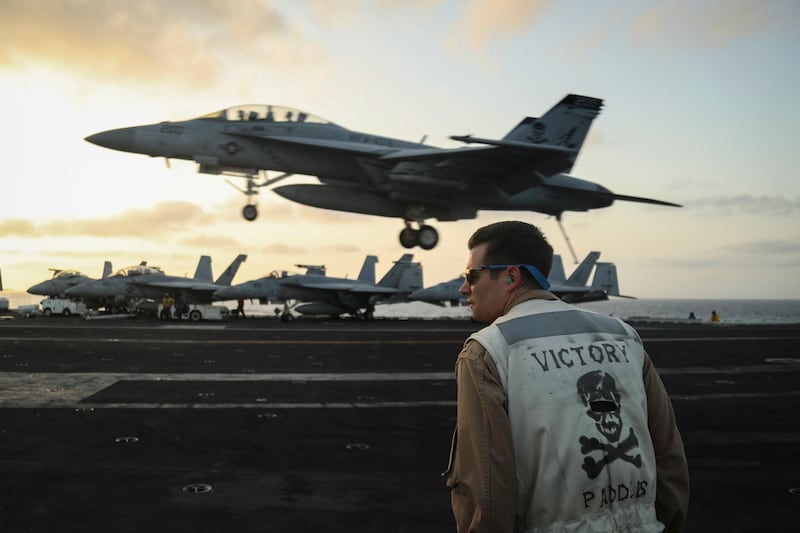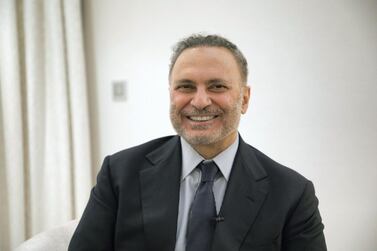Iran rejected wider talks with the international community that would tackle nuclear and military ambitions as the United States slapped yet more sanctions on Tehran, this time hitting a petrochemical holding group that Washington says supports the Islamic Revolutionary Guard Corps (IRGC).
French President Emmanuel Macron said on Thursday that both Paris and Washington wanted to stop Tehran developing nuclear arms and that new talks should include a discussion about Iran’s ballistic missile programme and other issues.
But Iran’s Foreign Ministry rejected any talks beyond the 2015 nuclear deal, a comprehensive agreement with international monitoring that was designed to prevent Tehran building a nuclear weapon.
The proposal for new talks comes amid heightened tensions in the region following recent sabotage attacks on Saudi, Norwegian and Emirati tankers off the UAE coast that Washington has blamed on Iran, which denies responsibility.
A report from a joint investigation by the three affected countries said the evidence pointed to the involvement of a “state actor”, without naming any country. The UAE Minister of State for Foreign Affairs, Dr Anwar Gargash, said the findings showed the need for UN action to protect maritime trade and global energy supplies from the region.
The attacks follow a year of mounting pressure on Iran after President Donald Trump withdrew the US from the nuclear agreement, officially called the Joint Comprehensive Plan of Action, and reimposed economic sanctions. He later offered to hold fresh talks on negotiating a new deal, without specifying how it would differ from the 2015 agreement.
"Under this circumstances, talking about issues beyond the deal ... will lead to further mistrust among the remaining signatories of the deal," Iranian foreign ministry spokesman Abbas Mousavi said in a statement.
Foreign Minister Mohammad Javad Zarif on Friday also weighed in, saying the US was in violation of UN Security Council resolutions by breaking from the JCPOA as were the other signatories for not upholding the agreement to normalise economic relations with Tehran. On the issue of Iran’s ballistic missile programme, he said, “Our missiles are not ‘designed’ for nukes, which we’re not developing.”
On Friday, the US targeted the Persian Gulf Petrochemical Industries Company (PGPIC) for providing financial support to the economic arm of the IRGC, a military organisation in charge of Iran’s ballistic missile and nuclear programmes.
The US Treasury Department said Iran's oil ministry last year awarded Khatam Al Anbiya, the IRGC's economic and engineering arm, 10 projects in the oil and petrochemical industries worth $22 billion (Dh80.8bn), four times the official budget of the IRGC.
The US Treasury said it had also sanctioned the PGPIC holding group's network of 39 subsidiary petrochemical companies and foreign-based sales agents. PGPIC and its units have 40 per cent of Iran’s petrochemical production capacity and account for 50 per cent of Iran’s petrochemical exports, it said.
"This action is a warning that we will continue to target holding groups and companies in the petrochemical sector and elsewhere that provide financial lifelines to the IRGC," Treasury Secretary Steven Mnuchin said in a statement.
Senior Trump administration officials, speaking on condition of anonymity, described the sanctions as the latest examples of a broad economic clampdown on Iran's economy that would help dry up funds for the IRGC, a key part of its military.
"This would continue to have a very chilling effect on the prospects for any future recovery for the Iranian economy," one official said, adding that the petroleum and petrochemical industries "have been serving for the last 40 years as a kind of institutionalised slush fund for the IRGC".
US entities are already barred from nearly all dealings with the Iranian economy, so the latest sanctions largely apply to non-US companies and individuals.
Three analysts and a former Treasury official said the latest sanctions will likely have only a modest effect since non-US companies are already shying away from doing business with Iran's petrochemicals sector because of existing sanctions.
Under sanctions reimposed on November 5 after Mr Trump left the Iran nuclear deal, anyone carrying out a significant transaction in Iranian petrochemical products could be hit by a range of punitive actions, including being barred from the United States.
Friday's step makes PGPIC and the 39 affiliates "specially designated nationals", a status that effectively blocks US persons from dealing with them. Further, anyone who does so themselves risk becoming a "specially designated national".
Suzanne Maloney of the Brookings Institution think tank described the latest sanctions as "a natural next step in what I think is a deliberately redundant array of restrictions".
"The administration is banking on the overlapping authorities and obstacles to compound the pressure on the Iranians and create a sense that the entire economy is off limits," she added.
The former Treasury official, who asked not to be named, said the new sanctions would have little effect because most multinationals had already ceased dealing with Iran, and described them as "a public relations" move.
"It's a good way of keeping the political pressure on the front page," the former official said.







